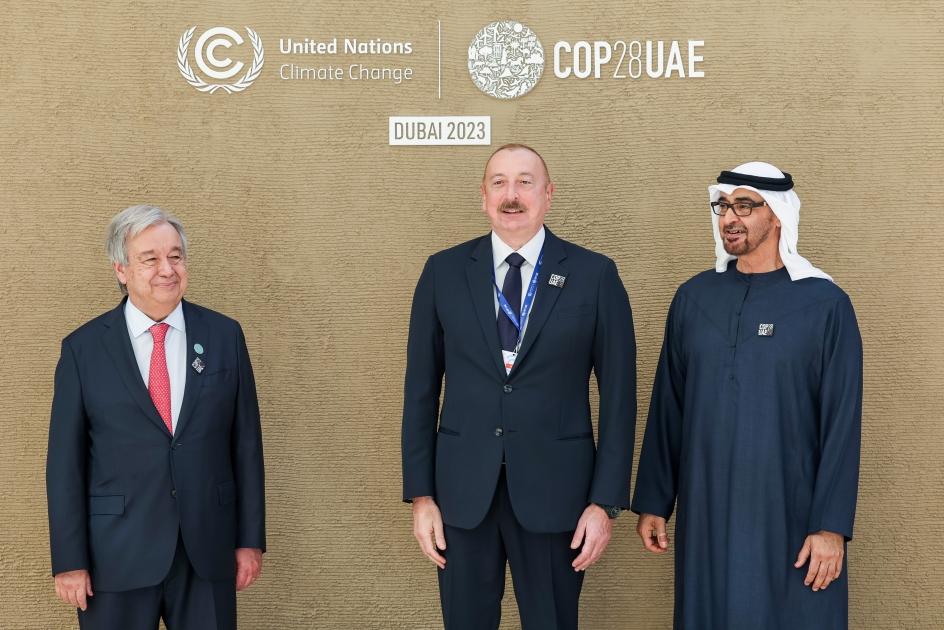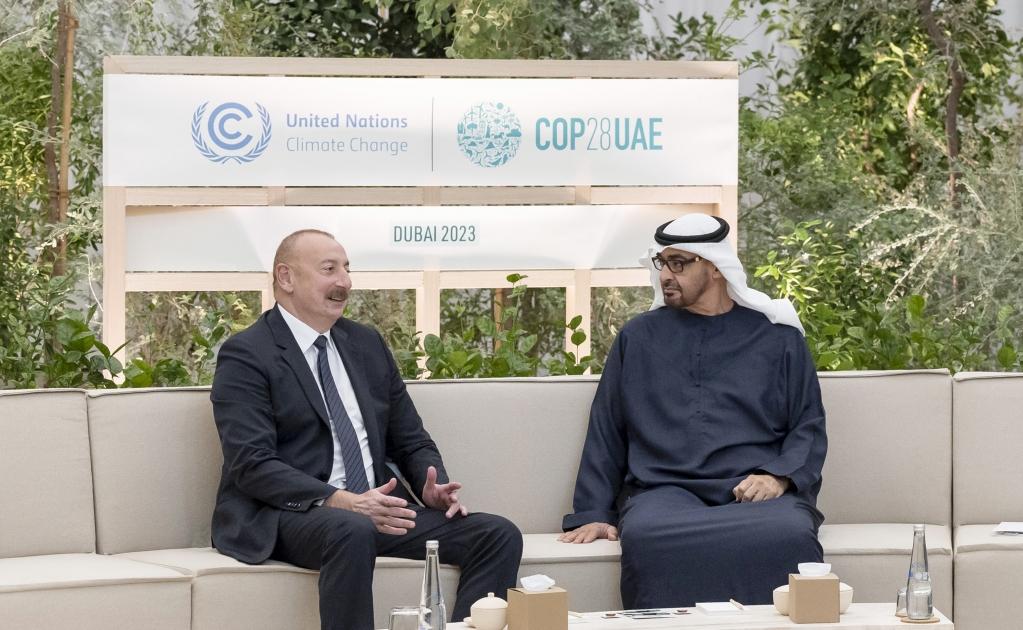COP28: Azerbaijan's role in global fight against climate crisis Analysis by Caliber.Az
The most important climate event of 2023 - COP28 Summit 2023, which is being held under the UN auspices, has kicked off in Dubai. The most important issues of the global agenda for the transition to clean energy, climate finance, social inclusion, etc. are being discussed at the 28th Conference of the Parties to the UN Framework Convention on Climate Change, the biggest city in the United Arab Emirates (UAE).
The presidents and heads of government from over 190 countries, as well as about 70,000 delegates, namely, scholars, experts, businessmen, representatives of civil society, journalists, etc., arrived in the UAE to participate in the summit, which will last until December 12.
Azerbaijani President Ilham Aliyev also arrived in the UAE to participate in the global climate forum.
The COP summits, initiated by the UN and held since 1992, are the key platforms for discussing the global climate agenda. All the most important decisions of combating global warming were made at these meetings.
For example, the Kyoto Protocol was signed during COP3 in 1997. Proceeding from this protocol, the countries made voluntary commitments to reduce emissions. This protocol initiated carbon trading for greenhouse gas emissions.
The COP21 forum held in 2015 was a very important milestone. The Paris Agreement was signed following the forum. According to the agreement, the countries agreed to limit the rise in temperatures on the planet in the 21st century to 2°C to pre-industrial levels and to prevent an increase in case of 1.5°C.

Alas, the global agenda has greatly changed after the COVID-19 pandemic and the subsequent economic crises, the threat of famine and energy collapse, mainly related to the Russian-Ukrainian war and the sanctions confrontation in the Eurasian region.
Today, many countries have to solve complex problems that have pushed the climate agenda into the background. Rising prices for fossil hydrocarbons, a shortage of natural gas, severe droughts that have led to a decrease in electricity production at hydroelectric power plants are forcing many countries again to use coal, peat, fuel oil that seem are withering away.
In turn, the global recession, which reduces the income of countries, primarily developing ones, deprives them of the opportunity to invest in the expansion of “green” generation, not to mention the fact that renewable energy sources can not replace traditional energy sources - oil and natural gas even in highly developed countries.
According to the forecasts by the International Energy Agency (IEA), at least $440 billion must be invested annually in the renewable energy sector worldwide during the next 10 years, and approximately by 2033 this amount will reach about $4 trillion, which will provide the economically developed regions with necessary energy volumes.
However, it will be necessary to invest about $20 trillion in the renewable energy sector to ensure a similar effect worldwide. Alas, according to IEA estimates, during the first five years after the signing of the Paris Agreement in 2015, investment in green energy grew by only two per cent per year, which is extremely low.
This figure has risen to 12 per cent per year since 2020 due to big investments in solar and wind energy, including a record year for offshore wind in 2021.
The dynamics of using renewable energy sources in developing countries decreased after the outbreak of the war in Ukraine. The population of poor countries worries about the falling standard of living, social problems and rising food prices. Voters demand that money must be spent on relevant issues, rather than on UN climate projects.
Moreover, the authorities of the richest countries that were at the forefront of the fight against climate change are changing the agenda. For example, the UK abandoned some climate obligations, while the party of climate sceptics has recently won in the Netherlands.
In turn, oil and gas producing countries, in particular, Russia, Iran, and OPEC countries, agreeing with the need to abandon fossil fuels, stand for a gradual and longer transition period to complete carbon neutrality.
However, climate problems have not disappeared; on the contrary, they have worsened. Oil and gas consumption in the world is growing, increasing emissions; as a result, the concentration of greenhouse gases in the atmosphere this year has reached another record level. Proceeding from the observations, 2023-2024 are expected to be the hottest in the world.
According to Article 14 of the Paris Agreement, the world must summarise the first results in 2023, after which it should do so every five years. A technical assessment of these results was published in September, and its conclusions are disappointing. If emissions are not reduced rapidly, the goals of the Paris Agreement will not be achieved.
UN experts think that there are fewer opportunities, and more decisive steps are required to reduce greenhouse gas emissions by 43 per cent by 2030 and 60 per cent by 2035 compared to 2019 and achieve net zero CO2 emissions by 2050.
UN Secretary-General António Guterres has recently noted that the planet is moving towards a temperature increase of at least 3°C. Humanity’s inaction creates big problems. Temperatures at the poles are rising rapidly, ice is melting, heat, floods and fires threaten people’s lives, leading to mass migration, etc.
Amid this negative situation, participants in the COP28 summit that started in Dubai are trying to reach a consensus on aspects of the global climate agenda. For almost two weeks, the reports will be heard and discussions on the problems of the transition to clean energy, climate finance aspects, nature-based solutions and social inclusion issues will be held at panel sessions of the climate conference in the UAE.
The decisions are expected to be made on climate change mitigation, sustainability and adaptation to climate risks following the forum. In particular, the establishment of a fund that will help compensate the world's poorest countries for economic damage from climate disasters must be one of the important decisions of the COP28 summit.
“I am pleased to announce the establishment of a $30 billion fund for global climate solutions. The fund, named Alterra, is expected to stimulate investments totalling $250 billion by 2030,” UAE President Sheikh Mohamed bin Zayed Al Nahyan said during the forum.
In particular, the statement was made during the summit that the UAE and Germany had already promised to allocate $100 million each to the fund, Italy was preparing to allocate 100 million euros, the UK - $75 million, the US - $24.5 million and Japan - $10 million. However, the charter and regulations of the fund, and the conditions for spending its funds for the needs of the countries of the Global South, have to be agreed upon by the end of the summit.
“The world is still far from the plans to meet key climate goals. Despite all efforts, there is 30 per cent more carbon dioxide in the atmosphere than before, and almost 40 per cent more methane. Bigger efforts are required in the energy transition as the danger of climate change are not distant risks,” King of the United Kingdom Charles III said at COP28.
At the same time, UK’s Prime Minister Rishi Sunak expressed readiness to make more efforts to resolve the climate issues. The UK’s government intends to make every effort to accelerate the development of renewable energy, protect forests on the planet and more actively attract private funding to these projects.
In turn, UN Secretary-General Antonio Guterres called on mining and fuel companies to invest more actively in the transition to renewable energy sources, recommended the governments help force these changes by introducing income taxes in industry to increase CO2 emissions, as well as ending subsidies for traditional energy based on fossil fuels.
In this regard, Azerbaijan has a number of advantages. Azerbaijan already about a decade and a half ago switched its electric power industry to less polluting natural gas, decommissioning or modernising power plants using fuel oil. In turn, the country has greatly reduced harmful emissions by introducing modern technologies in energy-intensive industry.
“Today, only 0.15 per cent of global emissions accounts for Azerbaijan,” National Coordinator of the UN Framework Convention on Climate Change and Azerbaijani Deputy Minister of Ecology and Natural Resources Umayra Taghiyeva, participating in COP28, said.
“These indicators will be consistently reduced. Azerbaijan committed to reducing greenhouse gas emissions by 40 per cent by 2050 compared to 1990, and also took the initiative to create a carbon neutral zone by 2050 in the territories liberated from occupation at the COP26 summit held in Glasgow in 2021,” she noted.
The national coordinator emphasised that Azerbaijan is also the regional leader in landscaping. Three million trees of different species will be planted in 2023, which makes a great contribution to improving the environment and climate. Azerbaijan has been recently actively developing the “green” generation segment, attracting many hundreds of millions of foreign investments into the renewable energy sector to move closer to carbon neutrality and diversify the energy sector.
Azerbaijan’s efforts are highly appreciated at the global level. For example, Azerbaijan ranked 32nd among 120 countries in the July report of the World Economic Forum (WEF) “Fostering Effective Energy Transition - 2023” due to the efforts made to transition to a sustainable and efficient energy system.
This is not surprising, taking into account the recent rapid transformations. For example, a “green” energy zone is being created in the Karabakh region. A dozen small hydroelectric power stations have been reconstructed and put into operation through the efforts of Azerenergy company. Solar stations are being built, power lines and substations will also be laid, and a Türkiye-Europe energy transit hub will be created in Azerbaijan’s Nakhchivan Autonomous Republic.
In general, Azerbaijan's renewable energy potential is estimated at 27 gigawatts onshore and 157 gigawatts on the Caspian shelf. Four gigawatts of renewable energy capacity will be developed by 2027. Moreover, Azerbaijan, which has enormous potential for the development of low-carbon energy, is also creating a transmission infrastructure (power lines, substations) to export about 80 per cent of electricity, mainly to Europe.
The Azerbaijani Energy Ministry has signed a number of memorandums with the Saudi Arabian ACWA Power, the UK’s bp, and the Australian Fortescue Future Industries for the implementation of large-scale green generation projects over the past few years. The UAE Masdar company has recently commissioned the biggest solar power plant in the region, the Garadagh solar power plant with a capacity of 230 MW. Moreover, the Energy Ministry signed additional agreements with this company for the commissioning of renewable energy facilities with a total capacity of 1000 MW.

The prospects for bilateral cooperation in the renewable energy sector were also discussed during the COP28 summit, as part of negotiations between Azerbaijani President Ilham Aliyev and UAE President Sheikh Mohamed bin Zayed Al Nahyan.
The importance of the joint investment fund, which will make an important contribution to the development of trade and economic relations and the investment sphere was noted during the conversation between the heads of state.
The importance of successful cooperation between the State Oil Company of the Azerbaijan Republic (SOCAR) and the Abu Dhabi National Oil Company (ADNOC) and their participation in joint projects, as well as interaction in shipping, transport, logistics and the development of the Middle Corridor along with AD Ports Group (UAE) and Azerbaijani specialised organisations was emphasised.
Azerbaijan’s capabilities in “green” energy could be observed in the interactive pavilion at the COP28 forum. Azerbaijan’s stands covered the information reflecting the country’s efforts to develop the renewable energy sector, reduce greenhouse gas emissions, develop “smart” villages, develop hydro resources, plant trees, restore the natural balance in Karabakh and other environmental projects.








